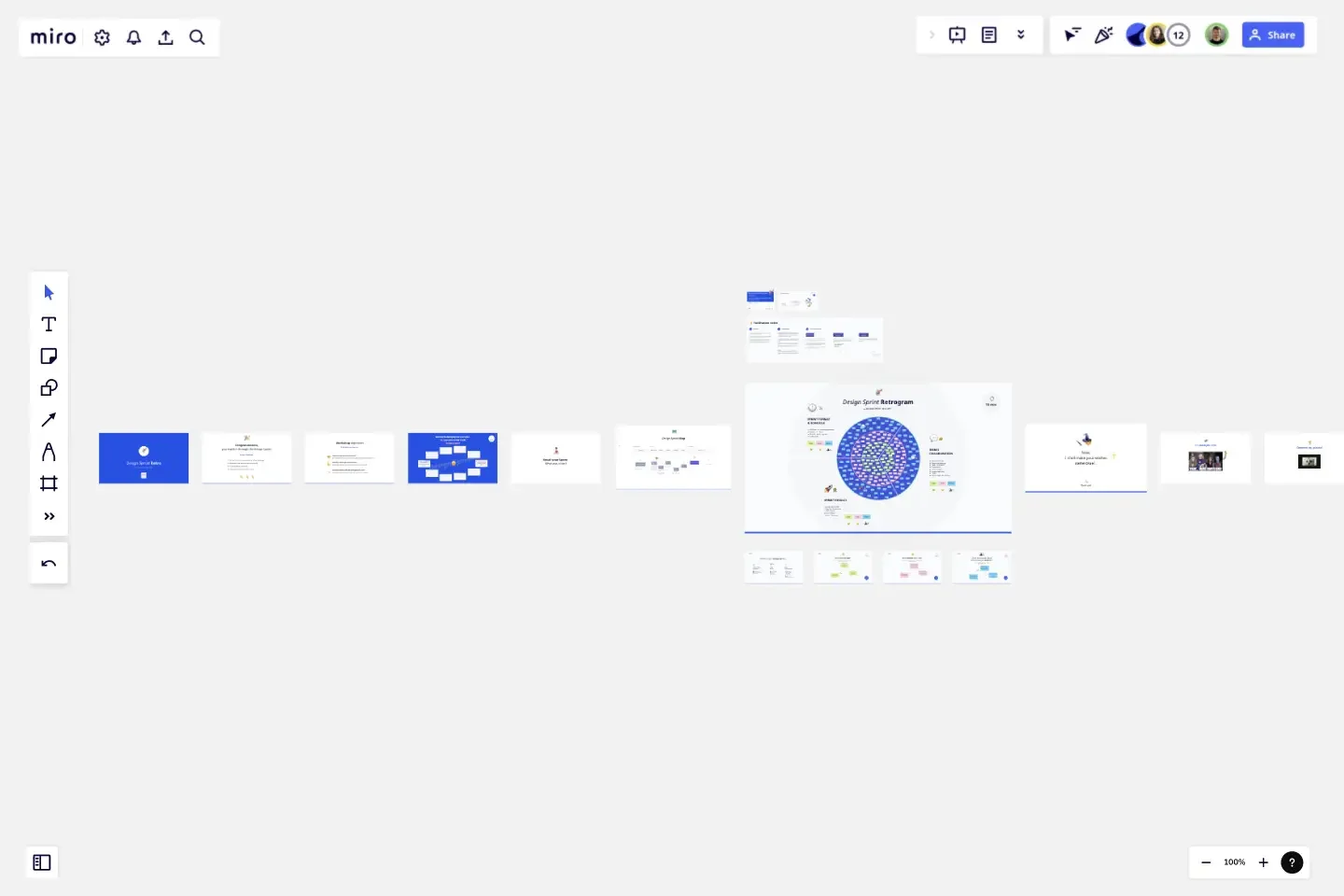Design Sprint Retrogram
A design sprint retrospective is a team meeting focused on improving the design sprint experience and the sprint results.
The design sprint retro (short for retrospective) occurs at the end of each Design Sprint and enables the team to reflect on their sprint experience and share their honest feedback on what went well, what were some challenges, and what should be done better next time.
With our Design Sprint Retrogram Template, facilitators can efficiently highlight opportunities for change and generate meaningful improvements on areas like:
Remote Design Sprint format and schedule (offline vs. online sessions, number of sprint days, daily plan, the team size and structure);
Team collaboration (communication, decision-making, team alignment, engagement, inclusivity, accountability, trust, psychological safety);
Design Sprint Results (the long-term goal, sprint questions, solution sketches, prototype, user testing).
Any Design Sprint Facilitator can use our template to wrap up their design sprints and optimize their next one.
Here's how the 1-hour workshop is structured:
Welcome & congratulate the team for their achievements
Short warm-up
Quick overview of the Design Sprint week
Design Sprint Retrogram overview
Three-step reflection: Highs, Lows, Whishes
Facilitation Notes: If this is your first time doing a design sprint retrospective, we've also included facilitation notes to help you navigate the board. We recommend deleting them before starting the actual workshop.
This template was created by Design Sprint Academy.
Get started with this template right now.
4Ps Retrospective
The 4Ps Retrospective template offers a structured framework for teams to reflect on past iterations or projects using the 4Ps model (Praise, Problems, Possibilities, and Plans). It provides elements for sharing positive feedback, identifying challenges, exploring opportunities, and setting action plans. This template enables teams to conduct retrospectives systematically, generate actionable insights, and drive continuous improvement. By promoting a balanced and comprehensive approach, the 4Ps Retrospective empowers teams to enhance collaboration, boost morale, and achieve their objectives effectively.
Retrospective by Axelle Vanquaillie
Works best for:
Retrospectives, Agile Methodology
The Retrospective template facilitates team reflection and continuous improvement by providing a structured framework for evaluating past iterations or projects. It encourages open communication, identifies successes, challenges, and action items, fostering a culture of learning and collaboration. Team members can share feedback, insights, and suggestions, enabling them to celebrate achievements, address issues, and implement positive changes in future endeavors.
SIPOC by Dagmar Vlahos
Works best for:
Agile Methodology
The SIPOC template by Dagmar Vlahos provides a structured framework for documenting the high-level process flow of a system or project. It helps teams identify Suppliers, Inputs, Processes, Outputs, and Customers, facilitating a holistic understanding of the value stream. By visualizing key process elements and interdependencies, this template enables teams to identify areas for improvement and optimize workflow efficiency, empowering organizations to deliver value more effectively and satisfy customer needs.
PI Planning Template
Works best for:
PI Planning, Product Management
The Miro PI Planning Template streamlines the Program Increment planning process for Agile teams. It facilitates a collaborative environment, enabling teams to efficiently align on strategies, identify dependencies, and convert decisions into actionable tasks. With features like real-time collaboration, Jira integration, and a centralized workspace, the template supports teams in enhancing efficiency, engagement, and decision-making.
Canvas Playground Template
Works best for:
Templates
The canvas playground template is the ultimate way to explore all the features that make up Miro's Intelligent Canvas. This dynamic and interactive space is designed to help you get work done faster while engaging your team. From AI creation and Sidekicks to intelligent widgets, this template allows you to try it all and discover how these capabilities can streamline your workflow and enhance collaboration.
Kanban Framework Template
Works best for:
Kanban Boards, Agile Methodology, Agile Workflows
Optimized processes, improved flow, and increased value for your customers — that’s what the Kanban method can help you achieve. Based on a set of lean principles and practices (and created in the 1950s by a Toyota Automotive employee), Kanban helps your team reduce waste, address numerous other issues, and collaborate on fixing them together. You can use our simple Kanban template to both closely monitor the progress of all work and to display work to yourself and cross-functional partners, so that the behind-the-scenes nature of software is revealed.
